新版八年级下册Unit-3-Co...
- 格式:docx
- 大小:30.80 KB
- 文档页数:24
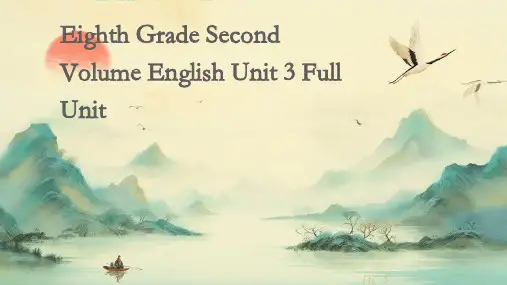
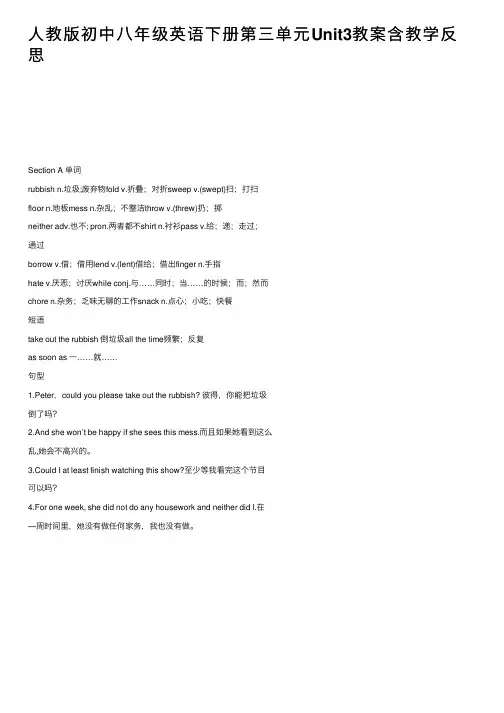
⼈教版初中⼋年级英语下册第三单元Unit3教案含教学反思Section A 单词rubbish n.垃圾;废弃物fold v.折叠;对折sweep v.(swept)扫;打扫floor n.地板mess n.杂乱;不整洁throw v.(threw)扔;掷neither adv.也不; pron.两者都不shirt n.衬衫pass v.给;递;⾛过;通过borrow v.借;借⽤lend v.(lent)借给;借出finger n.⼿指hate v.厌恶;讨厌while conj.与……同时;当……的时候;⽽;然⽽chore n.杂务;乏味⽆聊的⼯作snack n.点⼼;⼩吃;快餐短语take out the rubbish 倒垃圾all the time频繁;反复as soon as ⼀……就……句型1.Peter,could you please take out the rubbish? 彼得,你能把垃圾倒了吗?2.And she won’t be happy if she sees this mess.⽽且如果她看到这么乱,她会不⾼兴的。
3.Could I at least finish watching this show?⾄少等我看完这个节⽬可以吗?4.For one week, she did not do any housework and neither did I.在—周时间⾥,她没有做任何家务,我也没有做。
that everyone should do their part in keeping it clean and tidy.既然他们和⽗母⽣活在同⼀所房⼦⾥,他们就应该知道每个⼈都应该为保持房屋的⼲净和整洁尽⼀份⼒。
5.The earlier kids learn to be independent,the better it is for their future.孩⼦们越早学会独⽴,对他们的未来就越好。

八年级下册U n i t3课文讲解+知识点+练习work Information Technology Company.2020YEARUnit3 Could you please clean your room?Section A重点短语go out for dinner 出去吃饭stay out late 在外面待到很晚go to the movies 去看电影get a ride 搭车work on 从事finish doing sth. 完成做某事clean and tidy 干净整洁do the dishes 洗餐具take out the rubbish 倒垃圾fold your/the clothes 叠衣服sweep the floor 扫地make your/the bed 整理床铺clean the living room 打扫客厅no problem 没问题welcome sb. 欢迎某人come home fro m school/ work放学/下班回家throw down 扔下sit down 坐下come over 过来take sb. for a walk 带某人去散步all the time 一直;总是all day/evening 整曰/夜do housework 做家务shout back 大声回应walk away 走开.share the housework 分担家务a comfortable home 一个舒适的家in surprise 惊讶地get something to drink 拿点喝的东西watch one show 观看一个节目hang out 闲逛pass sb. sth. 把某物传给某人lend sb. sth. 把某物借给某人get sth. wet 使某物弄湿hate to do sth. 讨厌做某事do chores 做杂务help sb. (to ) d o /with sth 帮助某人干某事bring a tent带顶帐篷来buy some snacks买些小吃go to the store去商店invite sb. to a party邀请某人参加聚会make sb. do sth. 使某人做某事enough stress足够的压力waste of time浪费时间in order to为了get good grades取得好成绩mind doing sth. 介意做某事depend on依赖;依靠develop children’s independence发展孩子的独立性look after/take care of 照顾;照看do one’s part in (doing ) sth.做某人分内的事二、重点句型1. Could you please…..do sth.Could you please clean your room你能整理一下你的房间吗2. I have to do some work.我必须干些活。
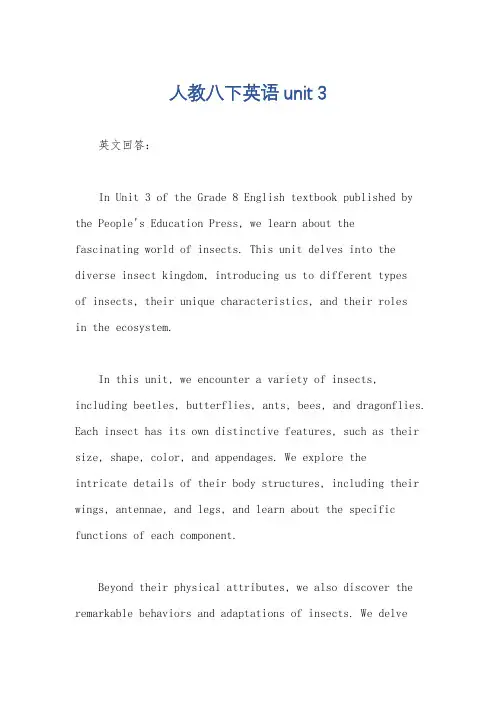
人教八下英语unit 3英文回答:In Unit 3 of the Grade 8 English textbook published by the People's Education Press, we learn about thefascinating world of insects. This unit delves into the diverse insect kingdom, introducing us to different typesof insects, their unique characteristics, and their rolesin the ecosystem.In this unit, we encounter a variety of insects, including beetles, butterflies, ants, bees, and dragonflies. Each insect has its own distinctive features, such as their size, shape, color, and appendages. We explore theintricate details of their body structures, including their wings, antennae, and legs, and learn about the specific functions of each component.Beyond their physical attributes, we also discover the remarkable behaviors and adaptations of insects. We delveinto the intricate social structures of ants and bees, the mesmerizing metamorphosis of butterflies, the predatory instincts of dragonflies, and the fascinating communication methods of crickets. These insights teach us about the diversity and complexity of insect life.Furthermore, Unit 3 emphasizes the importance of insects in the ecosystem. We learn about the crucial roles they play in pollination, decomposition, and nutrient cycling. We also explore the ecological challenges faced by insects, such as habitat loss and pesticide use, and discuss ways to protect and conserve these vital creatures.Overall, Unit 3 of the Grade 8 English textbook provides a comprehensive and engaging exploration of the insect world. It fosters a deeper understanding of insect diversity, behavior, and ecological significance,instilling in students an appreciation for the beauty and wonder of these often-overlooked creatures.中文回答:在人教版八下英语教材的第三单元中,我们学习了昆虫这个迷人的世界。
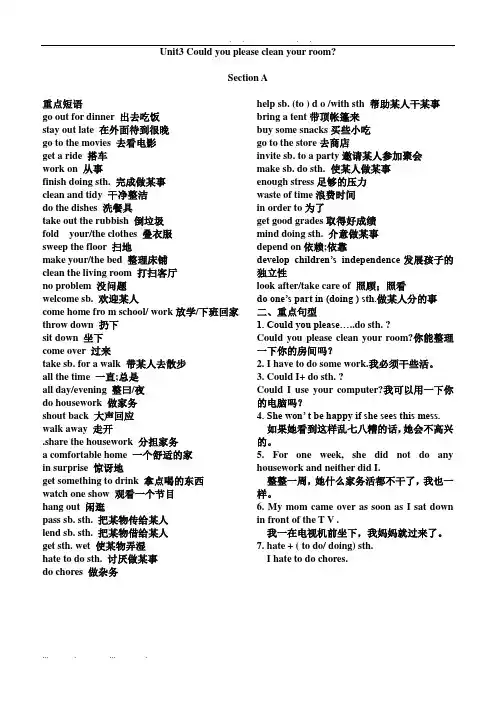
Unit3 Could you please clean your room?Section A重点短语go out for dinner 出去吃饭stay out late 在外面待到很晚go to the movies 去看电影get a ride 搭车work on 从事finish doing sth. 完成做某事clean and tidy 干净整洁do the dishes 洗餐具take out the rubbish 倒垃圾fold your/the clothes 叠衣服sweep the floor 扫地make your/the bed 整理床铺clean the living room 打扫客厅no problem 没问题welcome sb. 欢迎某人come home fro m school/ work放学/下班回家throw down 扔下sit down 坐下come over 过来take sb. for a walk 带某人去散步all the time 一直;总是all day/evening 整曰/夜do housework 做家务shout back 大声回应walk away 走开.share the housework 分担家务a comfortable home 一个舒适的家in surprise 惊讶地get something to drink 拿点喝的东西watch one show 观看一个节目hang out 闲逛pass sb. sth. 把某物传给某人lend sb. sth. 把某物借给某人get sth. wet 使某物弄湿hate to do sth. 讨厌做某事do chores 做杂务help sb. (to ) d o /with sth 帮助某人干某事bring a tent带顶帐篷来buy some snacks买些小吃go to the store去商店invite sb. to a party邀请某人参加聚会make sb. do sth. 使某人做某事enough stress足够的压力waste of time浪费时间in order to为了get good grades取得好成绩mind doing sth. 介意做某事depend on依赖;依靠develop children’s independence发展孩子的独立性look after/take care of 照顾;照看do one’s part in (doing ) sth.做某人分的事二、重点句型1. Could you please…..do sth. ?Could you please clean your room?你能整理一下你的房间吗?2. I have to do some work.我必须干些活。
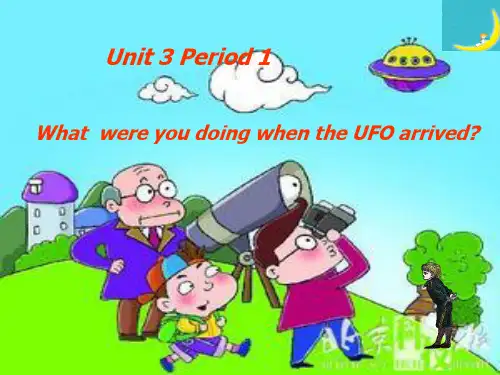
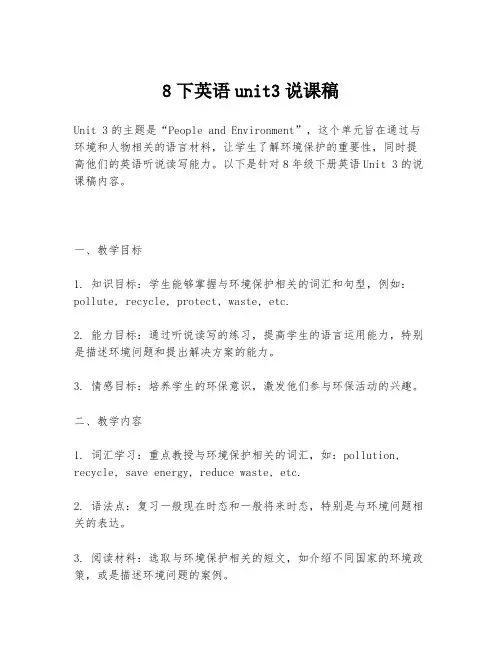
8下英语unit3说课稿Unit 3的主题是“People and Environment”,这个单元旨在通过与环境和人物相关的语言材料,让学生了解环境保护的重要性,同时提高他们的英语听说读写能力。
以下是针对8年级下册英语Unit 3的说课稿内容。
一、教学目标1. 知识目标:学生能够掌握与环境保护相关的词汇和句型,例如:pollute, recycle, protect, waste, etc.2. 能力目标:通过听说读写的练习,提高学生的语言运用能力,特别是描述环境问题和提出解决方案的能力。
3. 情感目标:培养学生的环保意识,激发他们参与环保活动的兴趣。
二、教学内容1. 词汇学习:重点教授与环境保护相关的词汇,如:pollution, recycle, save energy, reduce waste, etc.2. 语法点:复习一般现在时态和一般将来时态,特别是与环境问题相关的表达。
3. 阅读材料:选取与环境保护相关的短文,如介绍不同国家的环境政策,或是描述环境问题的案例。
4. 听力练习:播放有关环境保护的听力材料,让学生练习听力理解并回答问题。
5. 口语练习:组织角色扮演或小组讨论,让学生用英语表达对环境问题的看法和解决方案。
6. 写作训练:指导学生写一篇关于环境保护的短文或倡议书。
三、教学方法1. 情景教学法:通过设置与环境保护相关的情景,让学生在实际语境中学习和使用语言。
2. 任务型教学法:设计一系列与环境保护相关的任务,如调查、报告、倡议等,让学生在完成任务的过程中学习语言。
3. 合作学习:鼓励学生进行小组合作,共同探讨环境问题,提高团队协作能力。
四、教学过程1. 导入新课:通过展示环境污染的图片或视频,激发学生对环境保护的兴趣。
2. 词汇教学:通过图片、例句和游戏等方式,教授新词汇。
3. 语法点讲解:结合例句,讲解一般现在时和一般将来时态的用法。
4. 阅读训练:指导学生阅读有关环境保护的短文,理解文章大意,并回答相关问题。

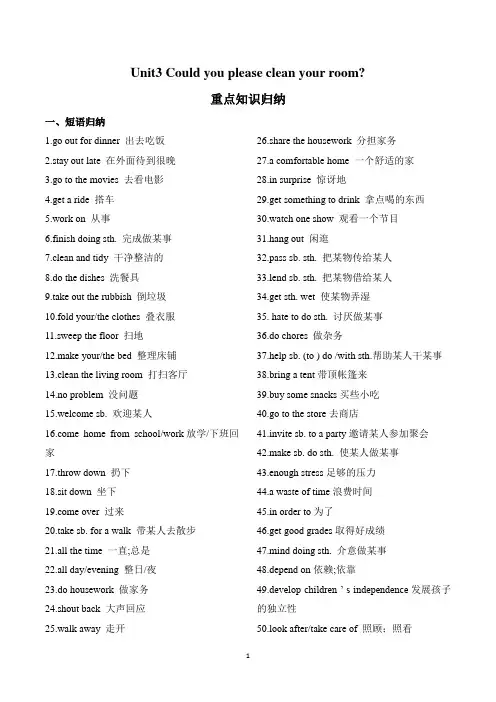
Unit3 Could you please clean your room?重点知识归纳一、短语归纳1.go out for dinner 出去吃饭2.stay out late 在外面待到很晚3.go to the movies 去看电影4.get a ride 搭车5.work on 从事6.finish doing sth. 完成做某事7.clean and tidy 干净整洁的8.do the dishes 洗餐具9.take out the rubbish 倒垃圾10.fold your/the clothes 叠衣服11.sweep the floor 扫地12.make your/the bed 整理床铺13.clean the living room 打扫客厅14.no problem 没问题15.welcome sb. 欢迎某人e home from school/work放学/下班回家17.throw down 扔下18.sit down 坐下e over 过来20.take sb. for a walk 带某人去散步21.all the time 一直;总是22.all day/evening 整日/夜23.do housework 做家务24.shout back 大声回应25.walk away 走开26.share the housework 分担家务27.a comfortable home 一个舒适的家28.in surprise 惊讶地29.get something to drink 拿点喝的东西30.watch one show 观看一个节目31.hang out 闲逛32.pass sb. sth. 把某物传给某人33.lend sb. sth. 把某物借给某人34.get sth. wet 使某物弄湿35. hate to do sth. 讨厌做某事36.do chores 做杂务37.help sb. (to ) do /with sth.帮助某人干某事38.bring a tent带顶帐篷来39.buy some snacks买些小吃40.go to the store去商店41.invite sb. to a party邀请某人参加聚会42.make sb. do sth. 使某人做某事43.enough stress足够的压力44.a waste of time浪费时间45.in order to为了46.get good grades取得好成绩47.mind doing sth. 介意做某事48.depend on依赖;依靠49.develop children ’ s independence发展孩子的独立性50.look after/take care of 照顾;照看51.do one’ s part in (doing ) sth. 尽某人的职责二、用法归纳1.finish doing sth. 做完某事2.want sb. to do sth. 想要某人做某事3.try (not) to do sth. 尽力(不)做某事4.let sb. do sth. 让某人做某事5.spend......(in) doing sth. 花费......做某事6.mind doing sth. 介意做某事7.learn to do sth. 学习做某事8.learn how to do sth. 学习怎样做某事9.The +比较级,the+比较级越......,就越.....三、词句精讲1.Could you please take out the rubbish? 你能把垃圾倒了吗?Could you please do sth ?请你(做)......好吗?用于提出请求,希望得到对方的肯定回答,说话的语气比较客气委婉。
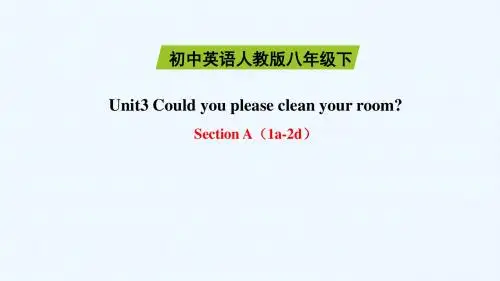
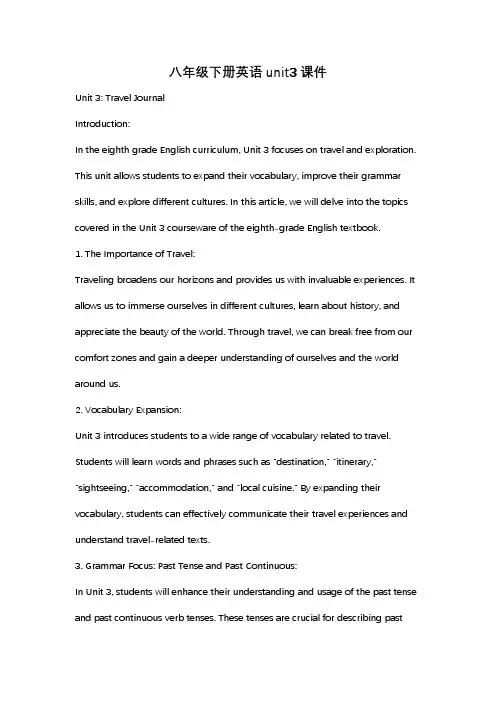
八年级下册英语unit3课件Unit 3: Travel JournalIntroduction:In the eighth grade English curriculum, Unit 3 focuses on travel and exploration. This unit allows students to expand their vocabulary, improve their grammar skills, and explore different cultures. In this article, we will delve into the topics covered in the Unit 3 courseware of the eighth-grade English textbook.1. The Importance of Travel:Traveling broadens our horizons and provides us with invaluable experiences. It allows us to immerse ourselves in different cultures, learn about history, and appreciate the beauty of the world. Through travel, we can break free from our comfort zones and gain a deeper understanding of ourselves and the world around us.2. Vocabulary Expansion:Unit 3 introduces students to a wide range of vocabulary related to travel. Students will learn words and phrases such as "destination," "itinerary," "sightseeing," "accommodation," and "local cuisine." By expanding their vocabulary, students can effectively communicate their travel experiences and understand travel-related texts.3. Grammar Focus: Past Tense and Past Continuous:In Unit 3, students will enhance their understanding and usage of the past tense and past continuous verb tenses. These tenses are crucial for describing pastevents and experiences. Through various exercises and activities, students will develop their ability to express themselves accurately in both spoken and written forms.4. Cultural Exploration:Unit 3 also provides students with the opportunity to explore different cultures around the world. Students will learn about famous landmarks, traditional customs, and unique festivals celebrated in various countries. This cultural exploration not only enhances their knowledge but also promotes cultural understanding and appreciation.5. Listening and Speaking Skills:Unit 3 focuses on improving students' listening and speaking skills. Students will listen to dialogues and conversations related to travel, allowing them to practice their listening comprehension. They will also engage in group discussions and presentations, where they can express their opinions and share their travel experiences with their classmates.6. Reading and Writing Skills:Reading comprehension passages in Unit 3 cover a wide range of travel-related topics. Students will read articles, travel guides, and personal narratives, which will help them develop their reading skills and expand their knowledge. Furthermore, students will have the opportunity to write their own travel journals, describing their dream destinations or sharing their past travel experiences. Conclusion:Unit 3 of the eighth-grade English courseware provides students with a comprehensive understanding of travel and exploration. Through vocabulary expansion, grammar focus, cultural exploration, and the development of listening, speaking, reading, and writing skills, students will gain the necessary tools to communicate effectively and appreciate the beauty of the world. Travel not only broadens our horizons but also enriches our lives, and this unit aims to inspire students to embark on their own journeys of self-discovery and exploration.。
新版八年级下册Unit-3-Co...Unit3 Could you please clean your room?复习学案词形转换rubbish(可数/不可数)_________fold (过去式) _________sweep(过去式) _________throw(过去式) _________take(过去式) _________make(过去式) _________pass (第三单) _________lend(过去式) _________snack(复数) _________stress(adj) _________depend(过去式) _________develop(过去式)_______ (名词)_______independent(名词)____________fair (反义词)________(名词)__________neighbor(社区)____________ill (名词)________drop(过去式)_________ (现在分词)_________shop(过去式)_________ (现在分词)_________welcome(过去式) _________angry(副词) _________重点难点讲解:Section A1.Peter ,could you please take out the trash?解析1Could you please do sth ?请你(做)......好吗?用于提出请求,希望得到对方的肯定回答,说话的语气比较客气委婉。
Could 不是can的过去式,是委婉、礼貌的说法。
回答用can. 常用答语肯定回答:Sure./ Of course./ Certainly./No problem.否定回答:Sorry , I can’t2013 湖北黄冈340.—Could I borrow your camera?— ___________,but please give it back by Saturday.A. I am sorryB. Of courseC. Certainly notD. No, thanks 2013山东菏泽115.—Sir , could you please put out your cigarette? This is a smoke-free(无烟的)school.— __________A. I'm sorry about this.B. No problemC. Sure, I'd love toD. Never mind2013内蒙古呼和浩特Tom , would you please ___ the box? It’s for your sister.A. not openB. don’t openC. not to openD. to not open解析2take out 取出(v+ adv)注: 跟代词做宾语,代词放中间;跟名词做宾语,可放在中间,也可放在后边()His teeth hurt badly. The dentist ______.A .take out it B. take out them C. take it out D .take them out短语take out the trash ______ take a walk ______ take away ______take back 收回take place ______ take off ______;take one’s temperature ________Could I at least finish watching this show?至少让我看完这个节目可以吗?解析Could I do a sth? 我可以做......吗?用于表达请求,语气比较委婉。
Could I go out with my classmate this weekend?解析finish v 结束;完成finish doing sth 做完某事2013四川雅安—Can you finish ____ these books before 10 o'clock?—Yes, I can.A. to readB. readC. readsD. reading4.I think two hours of TV______(be) enough for you!我觉得你看两个小时的电视已经足够了。
解析1two hours of TV表示时间、距离、金额、度量等词语作主语时,通常被视作整体,谓语动词用单数形式。
How time is flies! Three years _______(be) really a short time.解析enough注意enough 修饰名词时,置于名词前;修饰形容词时,置于形容词之后。
①In the old days ,people’s didn’t have _____ to eat.A. food enoughB. enough foodC.enough for②You are not ____ to take part in the match. Please work hard and try toimprove yourself.A. good enoughB. Enough goodC. well enough6. The minute I sat down in front of the TV, my mom came over .我刚坐在电视机前面,我妈妈就过来了。
解析the minute = as soon as “一...... 就......”as soon as连接的时间状语从句中,指未发生的动作,规律是:主句一般将来时,从句用一般现在时代替一般将来时如:I will tell him the news as soon as he comesback。
Please write to me the minute you get there.解析come over 过来7. You watch TV all the time and never help out around the house!你总是看电视,从不帮忙做家务!解析all the time = always 一直;总是Man’s understanding of nature is developing ____ . It never stays at thesame level .A. at the right timeB. for the first timeC. from time to timeD. all the time8. I’m just as tired as you are! 我和你一样累!解析as...as ... 和......一样......2013江西126. There are a small number of people involved, possibly______twenty.A. as few asB. as little asC. as many asD. as much as安徽It’s said that the power plant is now____ large as what it was.A. twice asB. as twiceC. twice muchD. much twice注比较级倍数表达句型为:倍数+as+形容词、副词原级+as+比较对临沂121. When an earthquake happens, and you are outdoors, youshould go to an open area as _____ as possible.A. quicklyB. quietlyC. loudlyD. slowly玉林156. Liu Ying is good at singing. She sings ______the famoussinger, CoCo.B. as good asC. as better asD. as the best asneither did I.一周的时间,她不做任何家务,我也不做。
⑴neither+可数名词单数, 谓语动词用第三单。
两者都不I think neither ______(book) _______( be) good.⑵neither +of +名词复数+谓语动词第三单。
Neither of the _____(book )_____(be) good.(3)neither …nor… 既不…也不…,连接两个词做主语,谓语动词由后一个主语确定(就近原则)Neither Tom nor Jim is a studentNeither Tom nor Jim____ (play) sports every day.(4)“某人(主语)也不”则用倒装句neither +助动词/系动词/+主语潍坊3. I have two sisters, but ________of them is a teacher.A. allB. neitherC. bothD. none鞍山5. —The teachers in that school speak either English or French, or even _______.—That's so cool!A. allB. bothC. neitherD. none浙江绍兴 6.—Which magazine do you like better, Crazy Readingor Teen’s space?—I like ___of them. They are useful for English lessons.A. noneB. neitherC. allD. bothD27. -Which do you prefer, a CD player or a walkman?-______. I prefer a portable computer.A. BothB. EitherC. NoneD. Neither州He speaks ______English ______French. Instead, he speaks German.B not only; but alsoC both; andD neither; nor( ) —The first one wasn’t bad.—__________ .A. So wasn’t the secondB. So the second wasC. Neither wasn’t the secondD. Neither was the second( )②–I don’t like rainy days.—________. Rainy days always make me sad.A. Neither do IB. So do IC. Neither I doD. So I do黄石中考1I can’t play the piano ,and _____.A. neither can my sisterB. my sister can’t , tooC. so can’t my sisterD. can my sister, either2013绥化—Iwent to the park yesterday.—____ . But I didn’t see you there.A. So do IB. So did IC. Neither did I解析share 分享;共用share sth 分享或共用某物share sth with sb. 与某人分享某物( ) All his friends _____ his happiness when he won the match.A. SharedB. Shared f romC. Shared with13.Could I hang out with my friends after the movie?看完电影后我能和朋友们一起闲逛吗?解析hang out 闲逛hang up 把......悬挂/挂起15. Could I borrow that book?我能借下你那本书看吗、Could you lend me some money?你能借我一些钱吗?解析borrow /lend/keep(1)borrow 借入,与from 连用,尤指主语“借进来”borrow sth from sb. 从某人那里借某物You can borrow the book from the library.(2)lend 借出,与to 搭配指借出去lend sb sth=lend sth to sb 把某物借给某人He doesn’t want to lend his book to others.(3)ke ep 保留,保存(延续动词,可以与表示一段时间的状语连用)指借一段时间记I want to __________ a bike from my friend but he didn’t ____ it to me,because T om had _____ it for two days.宁夏中考1 You may ___ the book for two weeks.A. keepB. borrowD. buy湖北恩施2 —May I ____ your dictionary?—Sorry. Li Lei ____ it for five days.A. lend; borrowedB. borrow; has keptC. borrow ; has borrowedD. lend; has lent西宁中考2 Although you like the book, you may only ______ it for two weeks.A. borrowB. keepC. lendD. stay.17. I hate to do chores.我讨厌做家务。